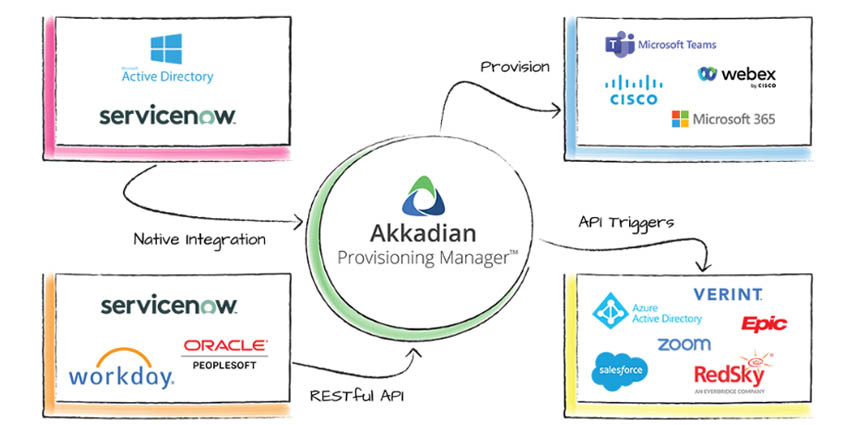Unified communications platforms are fast becoming a central hub for businesses embracing hybrid work.
As part of a broader software ecosystem, they give employees the ability to work wherever they are at a time of their choosing.
But while these applications are helping define the future of work, there is a danger that businesses could create a disjointed environment of fragmented systems. Doing so can hinder employee experience and generate a mountain of tasks for IT administrators.
Akkadian is helping businesses address this challenge with its flagship product Akkadian Provisioning Manager.
Provisioning Manager is perhaps best known for its ability to automate moves, adds, changes and deletes (MACDs) in UC platforms such as Cisco Collaboration, Webex and Microsoft Teams. However, its capabilities expand beyond collaboration platforms, reaching into related areas such as call monitoring, analytics, E911, call recording, CRM, HRIS, IT service management and more.
In essence, the benefits Provisioning Manager gives IT admins when it comes to collaboration platforms can be extended into other areas, making it a nucleus for integrating a diverse set of IT systems.
These benefits centre around automation — relieving IT departments of mundane, repetitive, manual tasks and giving them time to focus on more complex responsibilities.
“Akkadian Provisioning Manager can be a hub that ties all of these disparate systems together and makes sure UC platforms do not exist in silos,” David Levy, Director of Marketing at Akkadian Labs told UC Today.
“Businesses do not want their UC platforms walled off from other software. UC solutions may need to get information from or provide data to other systems.”
Two examples that encapsulate Akkadian’s ethos are its native integrations with ServiceNow and Microsoft Active Directory – two platforms that are heavily relied upon by countless enterprises.
These integrations mean that IT teams can kick off workflows in either of the two platforms that will extend to a UC system.
For example, when the HR department registers a new employee and creates a ServiceNow ticket to provide certain UC applications, Provisioning Manager can automatically set up the required phone, device, messaging account, etc. in Cisco Collaboration, Webex or Microsoft Teams — without any action from the UC administrator.
This process is two-way, meaning collaboration platforms can also feed information back to Active Directory and ServiceNow via Akkadian Provisioning Manager.
It’s important to highlight that this works throughout an employee’s tenure, not just when joining a new business. Akkadian estimates that on average most employees have 1.2 MACDs per year, which, in a company with tens of thousands of employees, can result in a huge number of menial tasks for its IT staff.
“This gets us to the Holy Grail of UC provisioning automation,” Levy said.
“It’s the full-cycle, both-ways, zero-touch provisioning that UC engineers are looking for.”
“They don’t want to get involved in day-to-day, manual, high-volume tasks. They want those tasks to be automated so they can focus on more strategic and impactful projects – especially in today’s environment when it’s hard to hire UC engineers.”
ServiceNow and Active Directory may be the most common integrations that customers ask Akkadian about. Still, Provisioning Manager is also capable of a host of other integrations through its RESTful API. This allows businesses to plug in platforms such as the Workday and Oracle PeopleSoft HR platforms. Like with ServiceNow and Active Directory, these tools can be used to kick off workflows in a business’ UC systems.
Elsewhere, the API Triggers feature of Provisioning Manager can be set up to react when a provision has been made in a UC system. For example, if a salesperson has just been set up with a new phone number, a trigger could automatically update their Salesforce account with this new information.
The ultimate aim of Provisioning Manager from an interoperability perspective is to keep various platforms in sync and communicating with each other – either by native integrations with ServiceNow and Active Directory or API integrations that businesses can use to plug in a whole host of other platforms.
“We keep our architecture agnostic so that it can talk to all these different systems,” Levy said.
“One of Akkadian’s tag lines is ‘we make things simple, seamless and unified’.
“We don’t want UC platforms to exist in a silo; we want them to have two-way communication with all these other systems as well.”







